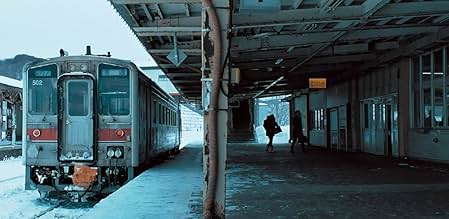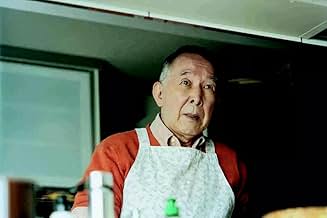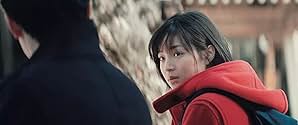VALUTAZIONE IMDb
6,7/10
8641
LA TUA VALUTAZIONE
Un film giudiziario incentrato sull'omicidio del direttore di una fabbrica.Un film giudiziario incentrato sull'omicidio del direttore di una fabbrica.Un film giudiziario incentrato sull'omicidio del direttore di una fabbrica.
- Premi
- 6 vittorie e 17 candidature totali
Recensioni in evidenza
I've just managed to catch up with this quite elusive film as I'm a big Akira Kurosawa film and from what I saw from the description and trailer, this would seem to be Koreeda's 'Kurosawa' film - there are obvious references to both Rashomon and High and Low.
The film indeed is clearly influenced by both those films, with a bit of Kurosawa's lesser known court drama Scandal thrown in. The plot follows a lawyer, asked by a colleague to assist with a seemingly straightforward capital punishment case. A middle aged man called Mizume is accused of, and has confessed to, the murder of a factory owner, and the theft of money. Mizume had only just been released after a long prison sentence for a previous murder. The lawyers job is to avoid the death penalty by trying to muddy the waters around the murder, and perhaps suggest it was an impulsive act and not planned (from what I can understand, Japanese law tends to have a range of gradations of homocide, with the judge ultimately deciding if it was serious enough for the death penalty).
The job of the lawyers is complicated by the apparent passivity of Mizume, and his constant changing of his story. At first, his explanations are just vague and contradictory, but he then states that he killed the man because he was paid by the mans wife to do so. As the main lawyer, Shigemora, digs deeper, he finds yet another possible motive.
I won't give away the ending, except to say that there is a 'probable' reason given in the end, but so many versions are given its not entirely clear what happened, or (seemingly the core question of the film) whether the truth is relevant at all to the operation of justice. Shigemora is caught in a Rashomon like situation of not knowing whether there is any one real truth, and whether knowing, or exposing, this truth is in any way relevant, morally, ethically or legally.
While the film sort of hedges the line between being a procedural and a more philosophical exploration of justice and truth (which reminded me a little of some recent Korean films such as Memories of Murder and Mother) the film also shows clear influence from High and Low as the main protagonist agonises over the guilty mans motivation, and starts to identify with him - shown rather allegorically in their prison conversations, with one face 'reflected' over another.
Rather like Kurosawa with Scandal and High and Low, the film seems to reflect the Directors concerns with the operation of justice in Japan, although those concerns seem pretty universal. In particular, the question of whether 'justice' and 'truth' are in any way compatible. Rather like Kurosawa's early films on the topic, the approach is perhaps a little too didactic for audiences not up to speed on the operation of the Japanese system.
As a film, I found it quite engrossing, while simultaneously a little frustrating. Koreeda is famous for a very deliberate, slow approach which in his best work absorbs the viewer into the life of his characters. Unfortunately, this type of film I think requires a more dynamic style, and the film is somewhat one-paced. Worse, it is hamstrung by some rather clunky didactic dialogue (the lawyer is followed everywhere by a young assistant, always asking stupid and naive questions which seem to have no other purpose than to explain to the audience what we are seeing), and some heavy handed metaphors. The two leads are good in the roles, but there is quite poor acting in some of the lesser roles - I think mostly due to the undercooked script and somewhat contrived plotting. I can't help feeling that Koreeda was trying to get something off his chest with this film, and found himself with a type of film making he's not really comfortable with.
So while the film is certainly quite gripping, and I found the insights into the Japanese court system very interesting, this is nowhere near the Directors best film. Its certainly worth anyones time with an interest in Japanese cinema to watch it, but be prepared I think to be a little disappointed if you are either a Koreeda fan (I certainly am), or for that matter, a Kurosawa fan.
The film indeed is clearly influenced by both those films, with a bit of Kurosawa's lesser known court drama Scandal thrown in. The plot follows a lawyer, asked by a colleague to assist with a seemingly straightforward capital punishment case. A middle aged man called Mizume is accused of, and has confessed to, the murder of a factory owner, and the theft of money. Mizume had only just been released after a long prison sentence for a previous murder. The lawyers job is to avoid the death penalty by trying to muddy the waters around the murder, and perhaps suggest it was an impulsive act and not planned (from what I can understand, Japanese law tends to have a range of gradations of homocide, with the judge ultimately deciding if it was serious enough for the death penalty).
The job of the lawyers is complicated by the apparent passivity of Mizume, and his constant changing of his story. At first, his explanations are just vague and contradictory, but he then states that he killed the man because he was paid by the mans wife to do so. As the main lawyer, Shigemora, digs deeper, he finds yet another possible motive.
I won't give away the ending, except to say that there is a 'probable' reason given in the end, but so many versions are given its not entirely clear what happened, or (seemingly the core question of the film) whether the truth is relevant at all to the operation of justice. Shigemora is caught in a Rashomon like situation of not knowing whether there is any one real truth, and whether knowing, or exposing, this truth is in any way relevant, morally, ethically or legally.
While the film sort of hedges the line between being a procedural and a more philosophical exploration of justice and truth (which reminded me a little of some recent Korean films such as Memories of Murder and Mother) the film also shows clear influence from High and Low as the main protagonist agonises over the guilty mans motivation, and starts to identify with him - shown rather allegorically in their prison conversations, with one face 'reflected' over another.
Rather like Kurosawa with Scandal and High and Low, the film seems to reflect the Directors concerns with the operation of justice in Japan, although those concerns seem pretty universal. In particular, the question of whether 'justice' and 'truth' are in any way compatible. Rather like Kurosawa's early films on the topic, the approach is perhaps a little too didactic for audiences not up to speed on the operation of the Japanese system.
As a film, I found it quite engrossing, while simultaneously a little frustrating. Koreeda is famous for a very deliberate, slow approach which in his best work absorbs the viewer into the life of his characters. Unfortunately, this type of film I think requires a more dynamic style, and the film is somewhat one-paced. Worse, it is hamstrung by some rather clunky didactic dialogue (the lawyer is followed everywhere by a young assistant, always asking stupid and naive questions which seem to have no other purpose than to explain to the audience what we are seeing), and some heavy handed metaphors. The two leads are good in the roles, but there is quite poor acting in some of the lesser roles - I think mostly due to the undercooked script and somewhat contrived plotting. I can't help feeling that Koreeda was trying to get something off his chest with this film, and found himself with a type of film making he's not really comfortable with.
So while the film is certainly quite gripping, and I found the insights into the Japanese court system very interesting, this is nowhere near the Directors best film. Its certainly worth anyones time with an interest in Japanese cinema to watch it, but be prepared I think to be a little disappointed if you are either a Koreeda fan (I certainly am), or for that matter, a Kurosawa fan.
With "The Third Murder" Hirokazu Koreeda sidepaths from the more lighthearted thematics his more recent movies like "our little sister" or "after the storm" had and reenters the realm of profound dramas in which he previously worked with in movies like "Like father like son" and one of his ealier works "after life". While the light hearted stuff is enjoyable and it is not as much of a risky "hit and miss" as a movie like "afterlife" might be, I think his more deep and serious movies are definitly more impacting and memorable, thats why I think "The third murder" is definitly one of Koreedas finest works.
In this crime thriller Koreeda explores heavily the ideas of truth, justice and especially motivation. Why do people say what they say? Can we really trust anyone? This movie was just so beautifully crafted with nearlly every scene you learn new things about character you thought you know already, just to find out how wrong you were, until you dont know what to believe anymore.
The cinematography was pretty unique to his other movies I would say. He added some emotionally driven music shots that fitted quite well with the tone of the movie and made some character interactions that were already tense and interesting even better by presenting interesting camera shots.
It was only fitting for Koreeda to give Masaharu Fukuyama the lead role given how well he did in "Like father like son" and he did a wonderful job again with this role. Also one of japans best actors "Koji Yakusho" did a perfect job, like most of the time and gave his role the exact nuance i was talking about previously, with being able to make yourself question your own judgement.
Overall I can only recommend this movie. Hirokazu Koreeda is one of Japans best living directos and "the third murder" is one of his best movies and I am already looking forward of rewatching this movie.
In this crime thriller Koreeda explores heavily the ideas of truth, justice and especially motivation. Why do people say what they say? Can we really trust anyone? This movie was just so beautifully crafted with nearlly every scene you learn new things about character you thought you know already, just to find out how wrong you were, until you dont know what to believe anymore.
The cinematography was pretty unique to his other movies I would say. He added some emotionally driven music shots that fitted quite well with the tone of the movie and made some character interactions that were already tense and interesting even better by presenting interesting camera shots.
It was only fitting for Koreeda to give Masaharu Fukuyama the lead role given how well he did in "Like father like son" and he did a wonderful job again with this role. Also one of japans best actors "Koji Yakusho" did a perfect job, like most of the time and gave his role the exact nuance i was talking about previously, with being able to make yourself question your own judgement.
Overall I can only recommend this movie. Hirokazu Koreeda is one of Japans best living directos and "the third murder" is one of his best movies and I am already looking forward of rewatching this movie.
In recent years, Hirokazu Koreeda has been among the most exciting and interesting Japanese filmmakers. In movies such as "Like Father, Like Son", "Our Little Sister" and "Shoplifters", he tells marvelous stories about seemingly ordinary and non-cimematic sitations....stories about real people and about problems which you rarely hear about in Japanese movies. Here, in a bit of a change of pace, Koreeda takes on a story about murder....and it's complex, strange and ultimately worth seeing. Sadly, however, the pacing is glacially slow...and many viewers ultimately might give up on the film before its conclusion.
The story is about a group of lawyers who have been a pretty hopeless case to defend. It seems a man has pled guilty to murder and burning a corpse...and he's done little to help himself avoid the death penalty. In addition, his story is very inconsistent and keeps changing. Inexplicably, instead of just going through the motions as most lawyers would do in a case like this, Shigemori keeps digging to learn exactly what did happen and why...and, not surprisingly, it's not what the case originally seemed to be.
The story is slow....very, very slow. For non-Japanese audiences, this slowness makes watching the film with subtitles a bit tough...and I found myself drifting off on occasion. My advice is to stick with it....the twist is shocking and exposes some issues rarely addressed in films...especially Japanese films. Not surprising, as Koreeda seems to enjoy addressing topics which other Japanese filmmakers avoid.
The story is about a group of lawyers who have been a pretty hopeless case to defend. It seems a man has pled guilty to murder and burning a corpse...and he's done little to help himself avoid the death penalty. In addition, his story is very inconsistent and keeps changing. Inexplicably, instead of just going through the motions as most lawyers would do in a case like this, Shigemori keeps digging to learn exactly what did happen and why...and, not surprisingly, it's not what the case originally seemed to be.
The story is slow....very, very slow. For non-Japanese audiences, this slowness makes watching the film with subtitles a bit tough...and I found myself drifting off on occasion. My advice is to stick with it....the twist is shocking and exposes some issues rarely addressed in films...especially Japanese films. Not surprising, as Koreeda seems to enjoy addressing topics which other Japanese filmmakers avoid.
The great lawyer Shigomori accepts a delicate case, the defense of Misumi, accused of theft and murder. Misumi, who thirty years earlier had served a prison sentence for murder, is now facing the death penalty. Astonishingly, the accused does not seem to care at all about his lot, the best evidence being that he does nothing to help his defender avoid it.
A specialist in childhood and family relations, Kore-eda ventures here into unfamiliar territory, the judicial thriller. The film raises interesting questions about the relativity of justice while at the same time keeping up the mystery: why does the accused, whose guilt is far from being proven, play cat and mouse with his defender and put obstacles in his way when he does everything in his power to save him from being hanged? Unfortunately, too much chatter and slowness diminishes the effectiveness of the film. But there are undeniable good points : the subtle acting of the two main protagonists, the beautiful nostalgic music by Ludovico Einaudi as well as the end of the film, a little more tonic than what preceded it. Quite a fair work on the whole but not up to the level of " Nobody Knows " or " Like father Like Son ".
A specialist in childhood and family relations, Kore-eda ventures here into unfamiliar territory, the judicial thriller. The film raises interesting questions about the relativity of justice while at the same time keeping up the mystery: why does the accused, whose guilt is far from being proven, play cat and mouse with his defender and put obstacles in his way when he does everything in his power to save him from being hanged? Unfortunately, too much chatter and slowness diminishes the effectiveness of the film. But there are undeniable good points : the subtle acting of the two main protagonists, the beautiful nostalgic music by Ludovico Einaudi as well as the end of the film, a little more tonic than what preceded it. Quite a fair work on the whole but not up to the level of " Nobody Knows " or " Like father Like Son ".
The Third Murder is a gloomy courtroom drama that deals with complex topics like control, fatherhood and righteousness. The story revolves around young lawyer Shigemori who is asked to defend mysterious Misumi. His father once defended the strange man when he committed murder in the past and he managed to change his impending death penalty into a life imprisonment sentence. Soon after his release from prison, Misumi admits to have killed his former boss in order to steal his wallet and settle some gambling debts. However, Misumi soon starts offering different versions of what actually happened. Shigemori is unable to figure his client out but determined to win the case. He starts investigating the complex case himself and stumbles upon the victim's quiet wife and their handicapped daughter who seem to have something to hide. While trying to win the case, Shigemori doesn't only learn more about the lives of everyone involved but about his own family life.
The Third Murder is a movie that is quite tough to watch. Its pace is particularly slow. The investigation process is contradictory, difficult and inconclusive. The film doesn't offer any shifts in action or tension. The conclusion won't please those who are expecting a dynamic crime flick.
However, this film has an almost hypnotically gloomy atmosphere that gives it its very own style from start to finish. The characters are quite intriguing because they are difficult to figure out. Protagonist Shigemori almost pales in comparison to his fascinating client Misumi who meanders between being a manipulative madman, a calm sage in harmony with himself and a mentally broken elder. The dialogues are particularly well-written. The acting performances are quite credible and almost make the movie seem to be a documentary. The locations suit the sinister atmosphere very well as they manage to look beautiful despite their bleak darkness. The calm and precise cinematography completes the picture of this soulful drama.
In the end, you will appreciate The Third Murder if you are ready to watch a slow-paced courtroom drama with an inconclusive plot but intriguing characters and gripping atmosphere. This movie most certainly isn't for everyone but it's good at what it's attempting to be. Patient viewers will be rewarded with some intellectual food for thought.
The Third Murder is a movie that is quite tough to watch. Its pace is particularly slow. The investigation process is contradictory, difficult and inconclusive. The film doesn't offer any shifts in action or tension. The conclusion won't please those who are expecting a dynamic crime flick.
However, this film has an almost hypnotically gloomy atmosphere that gives it its very own style from start to finish. The characters are quite intriguing because they are difficult to figure out. Protagonist Shigemori almost pales in comparison to his fascinating client Misumi who meanders between being a manipulative madman, a calm sage in harmony with himself and a mentally broken elder. The dialogues are particularly well-written. The acting performances are quite credible and almost make the movie seem to be a documentary. The locations suit the sinister atmosphere very well as they manage to look beautiful despite their bleak darkness. The calm and precise cinematography completes the picture of this soulful drama.
In the end, you will appreciate The Third Murder if you are ready to watch a slow-paced courtroom drama with an inconclusive plot but intriguing characters and gripping atmosphere. This movie most certainly isn't for everyone but it's good at what it's attempting to be. Patient viewers will be rewarded with some intellectual food for thought.
Lo sapevi?
- QuizThis is the first fiction film from Hirokazu Koreeda that was shot in anamorphic digital and framed in 2.35:1.
I più visti
Accedi per valutare e creare un elenco di titoli salvati per ottenere consigli personalizzati
- How long is The Third Murder?Powered by Alexa
Dettagli
- Data di uscita
- Paese di origine
- Siti ufficiali
- Lingua
- Celebre anche come
- The Third Murder
- Luoghi delle riprese
- Rumoi Station, Rumoi, Hokkaido, Giappone(the three lawyers arrive in Rumoi)
- Aziende produttrici
- Vedi altri crediti dell’azienda su IMDbPro
Botteghino
- Lordo Stati Uniti e Canada
- 89.315 USD
- Fine settimana di apertura Stati Uniti e Canada
- 10.670 USD
- 22 lug 2018
- Lordo in tutto il mondo
- 13.411.936 USD
- Tempo di esecuzione
- 2h 4min(124 min)
- Colore
- Mix di suoni
- Proporzioni
- 2.35 : 1
Contribuisci a questa pagina
Suggerisci una modifica o aggiungi i contenuti mancanti

























